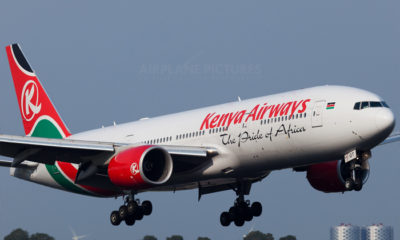Markets
Curb Export of Crimes Abroad
Published
6 years agoon

- Curb Export of Crimes Abroad
Nigeria grabbed the headlines for the wrong reason in the United Arab Emirates recently, when five of her youths smashed a bureau de change outlet in the Sharjah Emirate of the country and made away with Dh2.3 million (about N226.1 million in our local currency). The UAE police said the robbers had travelled on March 18 with a tourist visa, which means that their sole mission was for this felony.
This embarrassing image echo in the UAE coincided with Saudi Arabia’s planned execution of a female Nigerian, Kudirat Afolabi, a mother of two, who had been on death row for drug trafficking. Indeed, she was executed last Monday. Nigerian officials say that 23 other Nigerians are facing death sentences for the same offence. But as the Senior Special Assistant to the President on Diaspora Affairs, Abike Dabiri-Erewa, lamented Afolabi’s tragic fate, another Nigerian woman, Somide Wahid, was caught at the Jeddah Airport with hard drugs. This underscores the foolhardiness of drug traffickers.
According to the UAE authorities, the Nigerian bandits stormed the BDC in a commando style, broke the glass barriers between the customers and the staff and grabbed the cash in various denominations of foreign currencies and fled. Under the illusion that their host country’s security personnel were as ineffective as Nigeria’s, the robbers fanned out to different emirates to make their arrest difficult, if not impossible. But they were dead wrong as they were rounded up within 48 hours after the robbery.
Shortly after the story was published in Nigerian newspapers, a report credited to a travel agency alleged that the standard three-month visa permit to tourists had been reviewed for Nigerians to one month. But the UAE Embassy in Nigeria swiftly said the report was false. These robbers who have given our country a bad name deserve the maximum punishment in the UAE penal code to serve as a deterrent to others. Nigerians, who think other nations are as notorious as our country in the breakdown of law and order and abysmal failure of government to enforce its writ, are in for hard times.
This explains why 446 Nigerians are serving various jail terms for offences they committed in the UAE. Nigeria’s Ambassador to the UAE, Mohammed Rimi, revealed this when President Muhammadu Buhari held a town hall meeting with Nigerian residents there during his latest state visit. Besides those in prison, 5,021 others were involved in irregular residency breaches. But they were pardoned and their residency regularised.
On drug trafficking, The Economist of London newspaper reports that there are 32 countries globally, especially in Asia and the Middle East that prescribe death penalty for the offence. Seven of these nations — Indonesia, China, Vietnam, Saudi Arabia, Malaysia, Iran and Singapore —are no-nonsense enforcers of the punishment, despite global condemnation and calls for its reversal in respect for human rights. With zero-tolerance for trafficking in cocaine, heroin and similar substances, these countries don’t succumb to diplomatic pressure, even at the highest level. Tochi Iwuchukwu’s case, convicted of drug trafficking and executed in Singapore in 2007, demonstrated this. President Olusegun Obasanjo, while in office, wrote to his Singaporean counterpart in a plea for clemency for the Nigerian, but he was rebuffed. In December 2017, two Nigerian students in Malaysia were sentenced to death, while another was executed in Indonesia. This is an image crisis for Nigeria. Since 2009, the United Nations Office on Drugs and Crimes had identified the country as a major drug transit hub in West Africa. The global agency said, “In May 2010, Nigerian authorities stopped two separate cargo shipments totalling 63 kg of methamphetamine and amphetamine to Japan and South Africa.”
Instructively, Nigeria accused Saudi Arabia of not informing its embassy of the arrest and prosecution of Afolabi, until it was invited to take the last will of the deceased. Even more intriguing is that the Nigerian Consul-General in Jeddah, Saudi Arabia, reportedly wrote two memos to the Minister of Foreign Affairs, Geoffrey Onyeama, stressing the innocence of some of the accused, but they were allegedly not acted upon. Nigeria has always pleaded with the Saudi authorities to temper justice with mercy. But this has never paid off. Saudi Arabia’s Embassy in Nigeria, in response to the latest execution, said, “It is well known for all those interested in travelling to the Kingdom of Saudi Arabia that the penalty for drug trafficking is the death sentence and it is applied on all persons convicted without exception, as long as the evidence is established against them, and this is conveyed to every person prior to his trip to the Kingdom of Saudi Arabia.”
Interestingly, these drug traffickers were those who abused the advantage of their religious pilgrimages. A local media report claims that scanners, which could have been used to detect these incriminating substances in the luggage of delinquent pilgrims, were not used at the airports where they were lifted for the hajj in 2018. As a result, three traffickers were arrested last year on arrival in Saudi Arabia. If this is true, then, the Nigerian authorities should stop howling when her lawless citizens are caught in the act, but be ashamed of the country’s system that aids them. Such an act of omission or commission can only thrive where drug syndicates, working in cahoots with tainted aviation sector officials, have seized control. The foundation for this moral atrophy is laid in a justice delivery system that allowed 26 hard drug suspects to become fugitives as Premium Times reported on April 12. Again, thirty suspects on trial over eight years ago reportedly jumped bail.
In all, the get-rich-quick syndrome; unexplained wealth by public officials and individuals without a strong government mechanism to address the rot; corruption in the police that fuels the release of confessed killers and robbers in their custody and endless court trials of armed robbery cases, help to whet our youths’ appetite for life on the fast lane. But they should be conscious of the fact that unlike the shambolic governance at home, these countries do not condone such unlawful excesses.
However, the UAE, Saudi Arabia and others should not see any Nigerian deviant as the country’s true envoy. In Europe and the United States, there is an army of Nigerians in all the professions who are doing Nigeria proud and adding value to the economies of their host nations.
Is the CEO and Founder of Investors King Limited. He is a seasoned foreign exchange research analyst and a published author on Yahoo Finance, Business Insider, Nasdaq, Entrepreneur.com, Investorplace, and other prominent platforms. With over two decades of experience in global financial markets, Olukoya is well-recognized in the industry.

You may like
-
Nigeria Considers Creation of 31 New States Despite Economic Challenges
-
Visa Denial Sparks Airport Drama as Kenya Airways Defends Staff
-
Nigeria Seeks $15bn Investment to Revamp Power Sector, Offers Higher Tariffs
-
Nigeria’s Economy Shows Signs of Recovery with December PMI at 51.0
-
Nigeria Joins BRICS as Partner Country, Strengthening Global South Cooperation
-
70 Million Poorest of The Poor Nigerians To Get N75,000 From FG















